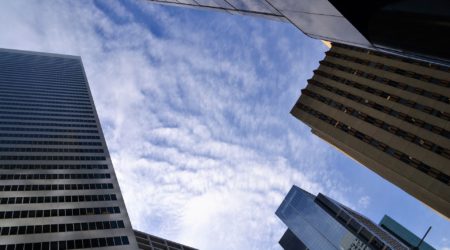8 Terms to Help You Understand Business Interruption Insurance
What is Business Interruption Insurance? 8 Terms to Help You Understand What’s Covered
If you have a business, you know your insurance policy covers you if your property is damaged or destroyed. But did you know business insurance can also cover lost income, if the loss is due to damaged or destroyed property? It’s called “business interruption insurance,” and coverage is provided by adding a special endorsement to your plan.
The business income insurance clause can be written in a variety of ways, but typically reads something like this:
We will pay for the actual loss of business income you sustain due to the necessary suspension of your “operations” during the period of “restoration.” The suspension must be caused by the direct physical loss, damage, or destruction to property. The loss or damage must be caused by or result from a covered cause of loss.
Let’s take a look at the eight terms you need to know in order to understand how business income insurance works, beginning with terms in bold above.
1. Actual loss sustained
As the term implies, business income insurance covers the actual losses you sustain as the result of interruption of your business. The interruption must be the result of damage to your insured property or direct physical loss of it, and the cause must be something not excluded by your policy.
For your insurer to pay, you must have suffered an actual interruption of business which led to loss of business income. If you didn’t actually lose business income, then the insurer only has to cover the dollar amount of your loss.
2. Business income
Business income is commonly defined as “The net income (net profit or loss before income taxes) that would have been earned or incurred by the insured and the continuing normal operating expenses incurred, including payroll.”
If a physical loss at your insured premises causes you to suspend operations either wholly or partially, and your business income suffers, the insurer is generally liable for the resulting reduction in your net income.
3. Period of restoration
The “period of restoration” is the amount of time needed to rebuild, repair, or replace the property that was destroyed or damaged so that you can get back to business. The period of restoration begins when the damage or loss happens and ends when you could reasonably have expected the property to be repaired or replaced.
Insurers are only liable for the loss of business income through the period of restoration. However, they remain liable through the entire period even if your policy expires before the period of restoration ends, as long as the physical loss occurred during the policy period.
The Insurance Service Office (ISO) business income endorsement includes an extended period of 30 days beyond the standard period of restoration. However, in some cases you may need more time than this 30-day limit; with this in mind, you can choose to increase the limit — in increments of 30 days — up to as long as 720 days by purchasing the extended period of indemnity optional endorsement available through ISO.
4. Extra expense
The business income endorsement of your property insurance policy can provide additional coverages, one of which is extra expense —that is, necessary expenses which you wouldn’t have sustained if it weren’t for the physical loss discussed above, and which you incur during the period of restoration.
When business income loss happens, you’re obligated to try to minimize or avoid the loss, and any expenses you incur in an attempt to limit this loss are covered as part of your business income loss. However, insurers like to see expenses like this reduce the business income claim, and won’t pay an expense that is more than the claim itself. For instance, your insurer may reimburse you $100 if this expense reduces your business income claim by $200, but not if it only reduces your claim by $50.
Necessary expenses beyond this — expenses which were necessary to keep the business running — may be recoverable if you have an extra expense provision in your policy.
5. Service interruption
The business income endorsement section of your property policy can also include optional, additional “extensions of coverage” which insure against loss of business income from a variety of things. Service interruption is one of these.
Service interruption provides coverage for direct physical loss, damage, or destruction to electrical, steam, gas, water, sewer, telephone, or any other utility or service including transmission lines and related plants, substations, and equipment of suppliers of such services.
The owners, managers, or operators of these utilities or services can’t be named in your policy, and the damage, destruction, or loss must be the result of or similar to the causes (known as “perils”) covered by your policy. There may also be limitations, such as the distance between your property and the location where the actual loss to the utility’s property occurs; or exclusions, such as for overhead transmission and distribution lines or for certain perils such as earthquakes.
6. Contingent business interruption (CBI)
Another extension of coverage, CBI is intended to cover business income losses you incur due to the loss, damage, or destruction of someone else’s property. This includes your direct suppliers of both goods and services, and also direct receivers of goods or services you manufacture or provide. As with service interruption, the damage must be of a type that would be covered by your policy had it happened to your own property.
This coverage is typically added to your policy by endorsement if you request it, and usually suppliers of the direct supplier—known as the “indirect” suppliers or “receivers”—must be identified. And since it only applies to your direct suppliers and receivers, this can leave a coverage gap for businesses that are part of a multi-tier supply chain.
7. Leader property
This endorsement provides you with coverage if you lose business income because another property nearby, which you don’t own or operate but which attracts business to your location, sustains direct physical loss, damage or destruction. (For example, an amusement park, casino, mall, etc.) The property must lie within a distance stated in your policy, and the damage must be of a type that would be covered under your policy if it happened to your own property.
8. Interruption by civil or military authority
This covers business income loss incurred when civil authorities prohibit you from accessing the covered property, such as during a quarantine or while structural safety is being assessed in the wake of a natural disaster. This coverage commonly applies for 14 or 30 consecutive days, and your insurer may impose a waiting period before a claim may be made. Waiting periods are typically 24, 48, or 72 hours.
There are many considerations to weigh when purchasing business interruption coverage. Your business is unique, and the options discussed here are only some of the possibilities. To learn more about business interruption and discuss which coverage options are best for your business contact Tommie@insuri.com today or visit our contact us page.












Leave a Reply